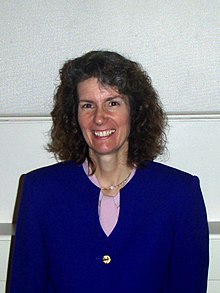Amanda Fritz
Amanda Fritz | |
|---|---|
 Fritz in 2008 | |
| Portland City Commissioner | |
| In office January 1, 2009 – December 31, 2020 | |
| Preceded by | Sam Adams |
| Succeeded by | Carmen Rubio |
| Personal details | |
| Born | April 1958 (age 63) England, United Kingdom |
| Political party | Democratic |
| Spouse(s) | Steve Fritz (1982–2014; his death) |
| Alma mater | University of Cambridge (BS, MS) |
| Occupation | Politician, nurse |
Amanda Fritz (born April 1958) is a British-American politician and retired psychiatric nurse from the U.S. state of Oregon.[1] Before being elected to Portland's City Council in 2008, Fritz was a neighborhood activist and seven-year member of the Portland Planning Commission.[1][2][3] She was also the first candidate to win public financing under Portland's Clean Elections system in 2006, though she lost to incumbent Dan Saltzman in the first round of that year's election.[4]
She was elected to City Council in the November 2008 election. She succeeded Commissioner Sam Adams, who vacated the seat to run for mayor.
Early life and education[]
Fritz was born in England and grew up in Leeds, West Yorkshire.[5] After graduating from the University of Cambridge, where she earned a bachelor's and a master's degree in Biological Sciences. She moved to the United States in 1979, where she attended nursing school in Pittsburgh, Pennsylvania and then moved to Rochester, New York.[6] She relocated to Portland in 1986.[6]
Career[]
Upon moving to Portland from New York, Fritz began working at Oregon Health & Science University (OHSU) as an inpatient nurse in the hospital's psychiatry department.[6]
In 1996, she was appointed to the city's Planning Commission, and served on the Commission until 2003. In 1999, Fritz was noted as a Planning Commission member who valued an emerging online list for contributing to the discourse on planning in the city.[7]
City council[]

In 2008, Fritz became the first non-incumbent to successfully run under Portland's public financing system. She took the most votes in the May primary election (43%) in a field of six candidates, and faced second-place finisher Charles Lewis (13%) in a November runoff election.[8] Fritz and Lewis were among the candidates who each qualified for $150,000 in public financing by collecting over 1,000 five-dollar contributions, and pledging to accept no other campaign contributions. Each received an additional $200,000 for the runoff election.[8] Fritz defeated Lewis with 70% of the vote in the runoff.[9] Fritz was also the first candidate to qualify for public funds under the program, in her first race, when she challenged incumbent Dan Saltzman in the 2006 election. In the 2008 race, her decisive victory in the primary enabled her to reach out to new classes of constituents; she was noted for expanding her appeal from neighborhood activists to the business community, and placing a strong emphasis on fiscal responsibility.[10]
She has been an advocate of the system since that first race, and wrote in support of it after winning the 2008 election.[11][12] Voters overturned it via referendum in 2010.[citation needed] Fritz credits the Public Campaign Finance system for allowing her the independence that led to saving Portland ratepayers $500 million by changing policy choices in the Portland Water Bureau in 2009.[13]
In June 2013, a shuffling of bureaus among the commissioners by new Mayor Charlie Hales saw Fritz assigned the Parks Bureau and the Bureau of Development Services, in place of her previous assignments.[14]
Fritz won re-election in 2016.[15]
Personal life[]
Fritz's husband, Steve, whom she married in 1982, died in a car crash in September 2014. Steve Fritz had worked for 27 years as a psychiatrist at Oregon State Hospital in Salem. The couple had three children.[6]
References[]
- ^ Jump up to: a b Frank, Ryan (March 30, 2006). "Fritz an activist who makes herself heard". The Oregonian.
- ^ Larabee, Mark (October 16, 2008). "'We're helping keep kids off the streets' - It's here. Here is part of Portland". The Oregonian.
- ^ Mitchell, S. Renee (August 22, 2003). "Democracy can collapse if people don't participate". The Oregonian.
- ^ Dundas, Zach (December 7, 2005) [online date December 6]. "Amanda Fritz: The long trip of Portland's first council candidate to get public cash". Willamette Week. Retrieved September 4, 2016.
- ^ Redden, Jim (November 4, 2008). "Fritz wins Portland City Council seat". Portland Tribune. Archived from the original on June 8, 2011. Retrieved September 4, 2016.
- ^ Jump up to: a b c d Schmidt, Brad (September 24, 2014). "Portland Commissioner Amanda Fritz credited husband, Steve, with helping her to second term in office". The Oregonian. Retrieved September 4, 2016.
- ^ Rose, Joseph (November 29, 1999). "Planners use online forum to swap ideas". The Oregonian.
- ^ Jump up to: a b Dworkin, Andy (May 22, 2008). "Fritz, Lewis in council runoff". The Oregonian.
- ^ "Metro area results". The Oregonian. November 6, 2008.
- ^ Giegerich, Andy (October 3, 2008). "Business credentials could decide race for City Council". Portland Business Journal.
- ^ Fritz, Amanda (November 21, 2008). "Beholden to all but indebted to none: public campaign financing". The Oregonian.
- ^ Ruiz, Amy J. (November 13, 2008). "Hall Monitor: A good round". Portland Mercury.
- ^ Slovic, Beth (August 11, 2009). "Hi, I'm Amanda Fritz". Willamette Week. Retrieved September 4, 2016.
- ^ Kost, Ryan (June 4, 2013). "Hales shuffles city bureaus". The Oregonian. p. B1. Retrieved June 7, 2013.
- ^ "Amanda Fritz has won re-election to the Portland City Commission". Retrieved May 17, 2016.
External links[]
| Wikimedia Commons has media related to Amanda Fritz. |
- Commissioner Amanda Fritz on City of Portland website
- People from Leeds
- Portland City Council members (Oregon)
- Oregon Democrats
- American nurses
- American women nurses
- 1958 births
- Living people
- British emigrants to the United States
- Women city councillors in Oregon
- Alumni of the University of Cambridge